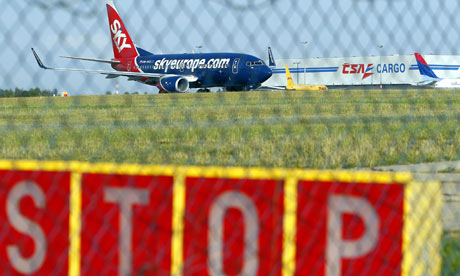
The end for SkyEurope? The Slovakia-based low-cost airline has filed for bankruptcy. Photograph: Radim Beznoska/Isifa/Getty Images
Budget carrier SkyEurope, which flies to eastern Europe from Luton and Manchester, became the latest casualty of the airline industry downturn today as it filed for bankruptcy.
The Slovakia-based airline suspended all flights immediately, disrupting travel plans for thousands of British passengers. SkyEurope, whose main airports are at Bratislava, Vienna and Prague, warned that a refund "may not be possible" for customers who booked with the airline directly. Abta, the British travel agents' association, said the collapse underlined the need for a compensation system for airline passengers.
"This airline failure in a tough economic climate, along with several others last year, highlights the need for urgent action by the government and EU to plug this gaping hole in customer financial protection," said Mark Tanzer, Abta chief executive, whose members are required by law to pay into a compensation scheme.
SkyEurope's demise came amid news that the world's leading airlines have slumped to a $2bn (£1.2bn) loss in the industry's most profitable trading period, as falling fares and rising oil prices wreak further damage on carriers' bottom lines.
The International Air Transport Association (Iata) said 54 airlines, including British Airways, Cathay Pacific and American Airlines, reported combined losses of $2bn in the three months to 30 June. The loss is more than double the deficit last year, when the credit crunch was beginning to squeeze business class bookings – the financial lifeblood of long-haul carriers.
Brian Pearce, Iata's chief economist, said: "Traditionally airlines make 50% of their profits in the second quarter. This suggests that losses this year are going to be pretty large." Iata is predicting a $9bn loss for the industry this year, driven by falling fares and burgeoning oil prices.
Ireland's national carrier, Aer Lingus, last month illustrated the dangers facing long-haul carriers from lower fares as it announced, first-half operating losses had widened from €23.4m (£20.6m) last year to €93m. And Australian carrier, Qantas, reported its worst performance in six years losing A$93m (£48m) in the second-half while BA lost £148m in the three months between April and June.
Pearce said tumbling yields, or the average revenue per passenger, had driven airlines into a deeper loss, exacerbated by an oil price that has risen from $45 a barrel in March to $70 now.
"Although there are some signs of passenger and freight numbers stabilising, if not picking up, average fares continue to plummet," said Pearce. Average yields fell 20% in the second quarter as Iata warned that capacity reductions were slowing down – signalling that competition will remain intense on some routes, holding down fares. "Elimination of excess capacity will be the key to stabilising revenues as well as volumes," said Iata. Passenger numbers are showing signs of a recovery, with traffic falling by just 2.9% in July compared with declines of 7.2% in June and 9.3% in May. Iata believes that more planes need to be grounded, which would lessens competition on some routes and therefore push up fares and revenues.
Sep 17, 2009
Budget carrier, which flies to eastern Europe from Luton and Manchester, is the latest casualty of the airline industry downtur
Posted by
xiaoming
at
9/17/2009
![]()
![]()
Labels: Science - Technology, World News readmore
Subscribe to:
Post Comments (Atom)





0 comments:
Post a Comment